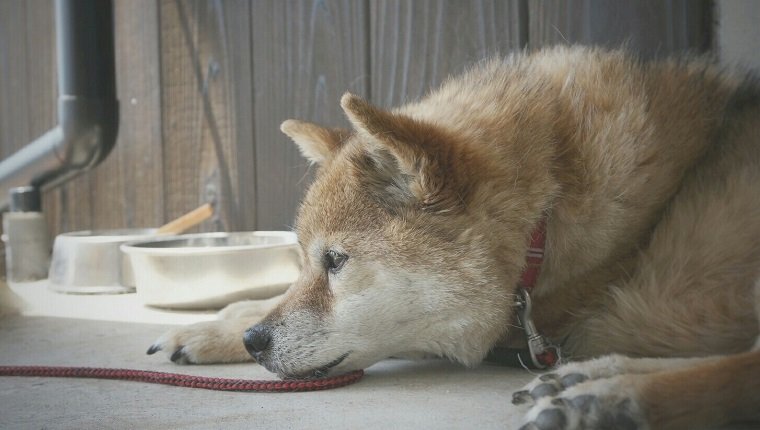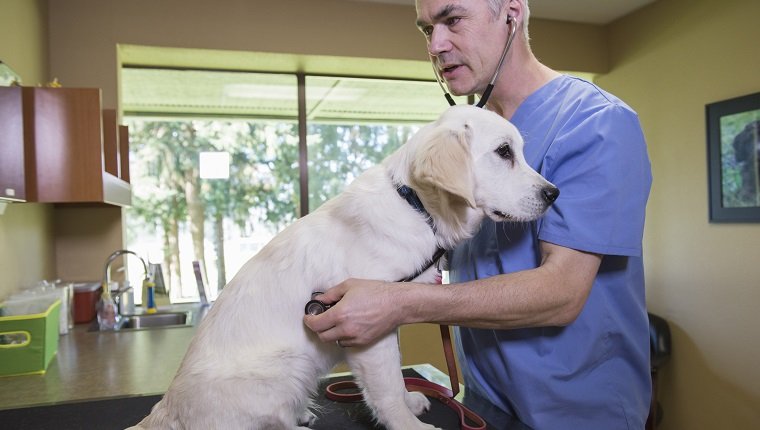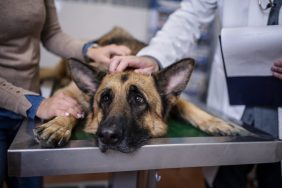Myasthenia gravis in dogs is a disorder that breaks down transmission of signals between the nerves and the muscles. This then results in muscle weakness and fatigue in canines who suffer from it.
The condition can be congenital and detectable in puppies at six to eight weeks of age, or it can be acquired and appear in dogs at one to four years of age or nine to 13 years of age. However, it rarely starts to appear in dogs at any age in between.
Often it affects the muscles in the esophagus, though it can affect muscles elsewhere in the body. If you notice the signs of myasthenia gravis in your dog, then you should see your veterinarian immediately.
Here’s what you should know about the symptoms, causes, and treatments for myasthenia gravis in dogs.
Symptoms Of Myasthenia Gravis In Dogs

A common symptom of myasthenia gravis in dogs is weakness in the esophagus that leads to dilation, which can hold food instead of allowing it to pass into the stomach. “Megaesophagus” is the term for this condition.
Often, it will lead to symptoms such as:
- Regurgitation
- Trouble swallowing food or drinking
- Retching
- Abdominal contractions similar to those associated with vomiting
However, the symptoms of myasthenia gravis are not always limited to the esophagus or throat. There are also a host of other signs of the disorder that you should look out for and consult a vet if you spot them.
Here are several other symptoms you might expect to see in a dog with myasthenia gravis:
- Voice changes
- Weakness or cramping that gets worse with exercise and better with rest
- Inability to close the eyes or blink
- Sleeping with eyes open
- Absent gag reflex
- Excessive drooling
- Difficulty breathing
- Aspiration pneumonia
- Tumor in the chest cavity called a thymoma
Causes Of Myasthenia Gravis In Dogs

Myasthenia gravis is often a congenital disease, meaning it is present from birth in dogs. Even when dogs acquire the condition after puppyhood, a combination of genetic factors usually interact with environmental factors to cause the disease.
Myasthenia gravis is an immune-mediated condition, which means the immune system response is abnormal and causes symptoms. Like many autoimmune diseases, myasthenia gravis also has a genetic component. Therefore, certain breeds are more at risk.
Breeds that are predisposed include:
- Akitas
- Golden Retrievers
- Great Danes
- Labrador Retrievers
- Newfoundland
- Scottish Terriers
Non-spayed female dogs are also at greater risk.
Additionally, myasthenia gravis may appear as a secondary condition to certain forms of cancer.
Treatments For Myasthenia Gravis In Dogs

Some dogs who suffer from myasthenia gravis will also end up inhaling the food, liquid, or regurgitated vomit and develop aspiration pneumonia. These dogs may then require oxygen therapy, antibiotics, and intravenous fluids.
If a dog is unable to eat without regurgitating, they may require a feeding tube until they stabilize. In cases where a thymoma, or chest tumor, is found, dogs will likely need surgery.
Vets may use anticholinesterase drugs to suppress antibodies in the immune system that are attacking the muscle receptors, which can improve muscle strength and allow the muscles to function properly. After that, vets may prescribe anti-acetylcholinesterase medications for the rest of the dog’s life.
After recovery, dogs should eat and drink from elevated bowls and their heads should stay elevated for ten to 15 minutes after eating. This will reduce regurgitation and the risk of aspiration pneumonia. Your vet may additionally prescribe steroids or other immune system suppressants for ongoing treatment.
Has your dog ever suffered from myasthenia gravis? What treatment did your vet recommend? Let us know in the comments below!









